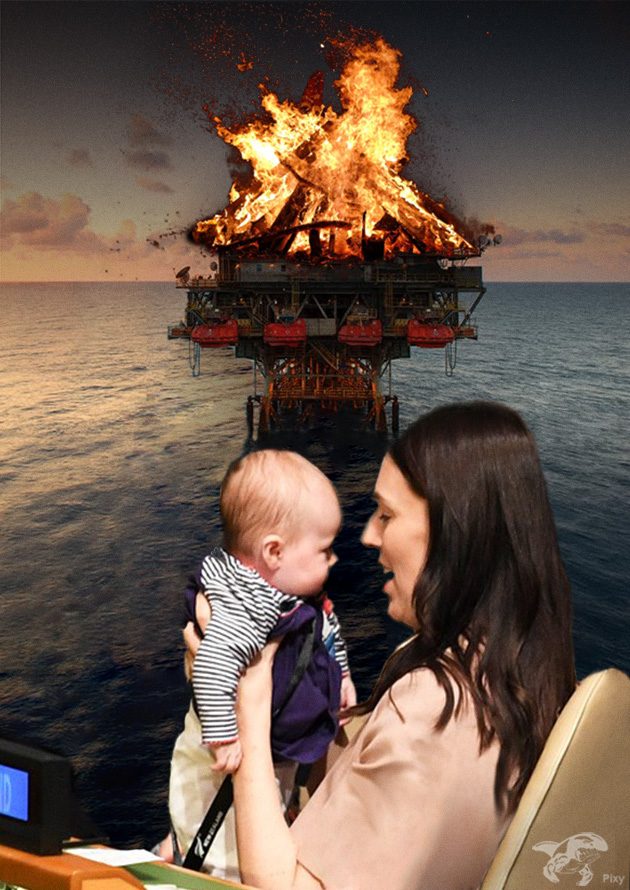Well, well, well… no, that was not intended as a pun. The fact that we have closed down future oil and gas permits has already started to have an effect on the economy, at a time when things are definitely turning downwards.
The departure of Chevron and Equinor from New Zealand’s exploration scene is a huge lost opportunity and shows how quickly the risks from the government’s exploration ban are coming to pass, energy analyst John Kidd says.
Chevron is a global-scale player. It was exploring for resources to supply low-emission gas to meet rising energy demand in Asia – much of it currently met by coal – as it does from its LNG facilities in Australia, he said.
“A company the scale of Chevron wasn’t here to make a small discovery. They were here looking for something to supply the export market,” Kidd told BusinessDesk.Development of such an export LNG play in New Zealand “would have made a meaningful contribution to regional emission reductions and air quality,” he said. “But that’s a logical trail that this government is just not interested in.”
The Labour-led government last year shocked the industry when it banned new offshore exploration citing the need to signal a long-term transition from fossil fuels. It claimed the 100,000 square-kilometres of exploration acreage already issued – a quarter of which was held by Chevron and Equinor – would be sufficient to ensure security of energy supplies.
But the decision, taken against officials’ advice, was challenged by many, given the International Energy Agency is forecasting a 20-45 percent increase in demand for gas by 2040, in-part to replace higher-emitting coal and oil from global electricity and petrochemical production.
They went ahead and did it, even though the future economic benefits of exploration could have been significant. As it always is with the big players, when there is even a hint of insecurity, they head off elsewhere, leaving our valuable energy resources in the ground, or under the sea bed.
The New Zealand Institute of Economic Research estimated the ban would reduce the country’s GDP by $15-$38 billion during the next 30 years, raise prices and reduce investment.
Let us not pretend that we will be just fine and dandy on renewables. There is nowhere in the world – nowhere – that can survive on renewables, and that does not look likely to change anytime soon.
Chevron and Equinor, the former Statoil business, yesterday said they would not be proceeding with the next five-year stage of work in the three permits they jointly hold off the North Island’s east coast. They emphasised their decision was based solely on the outcome of work to date, relative to other opportunities they have elsewhere, and was not a response to the change in government policy.
Chevron said it believed resources in the Pegasus-East Coast basin could be safely developed in future – something that can’t happen under the permitting ban.
Greenpeace may be crowing from rooftops, but… hang on a minute.
Gas meets about 21 percent of the country’s energy needs and has about half the emissions of coal. It produced about 12 percent of the country’s electricity last year and is a critical back-up fuel for the country’s renewable power supplies during dry years.
Overall, oil and gas contributes about $2.5 billion to annual GDP, according to the Petroleum Exploration and Production Association.
Kidd said the sector – and the broader extractives industry – is operating under an “umbrella of uncertainty” and the wider community should be more concerned.Kidd said last year’s exploration ban was made without any evidence. The quality of debate around energy and climate policy in New Zealand is “very poor” and appears to be becoming more polarised, he said.
Sharechat.
“The binary-type thinking behind some of these decisions is extremely short-sighted and naïve in the international context.”
Naive? I am sorry, sir. You obviously didn’t realise that, at the time, Jacinda was about to head off to Europe and needed to impress her climate change buddies, so she did this just before she left. If it negatively impacts on the economic wellbeing of the country and causes problems with energy security, well dang. What really mattered was those photos with Justin and Emmanuel.
What else matters in the world of ‘Princess’ Jacinda? Keeping the lights on is a secondary concern. National will be back one day to sort it all out.
Thanks, Jacinda.

